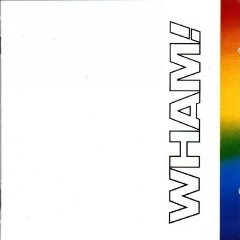You know what not enough greatest hits albums start with? Politicised UK hip-hop tracks from 1982, that’s what. Yet here we find ‘Wham! Rap (Enjoy What You Do)’ telling the three million unemployed not to give up on the life they want while the backing singers butchly chirp "D.H.S.S.!". Has there been a band – pop or otherwise – since that have gone for such an enticingly bizarre opening gambit? Alright, probably, but not exactly on an everyday basis, which is part of what makes The Final something of a prince among its peers. To new listeners, it’s bound to be full of genuinely unaccountable surprises. For those who were fans at the time, it’s a marvellous vindication. And for those for whom Wham! were the enemy in the 1980s, it shows them unexpectedly ripe for reassessment…
Not that they actually were seen as the enemy in the early days. In fact, the NME wouldn’t be this excited about pop rap again until the resistance-anihilating emergence of Betty Boo almost a decade later, and the attraction is pretty clear even now. Subsequent singles would move the band further into the white-boy soul territory that the likes of ‘No Parlez’ and the early Style Council singles would occupy to tremendous commercial and critical effect, and their penchant for teenage kicks coupled with a sharp observational edge (consider, for instance, ‘Young Guns (Go For It)”s reference to "sleepless nights on an HP bed") rang far truer than the fantastical farces then peddled by the rest of the New Pop brigade. Plus, they had a keen ear for the iconic moment (the dropped-out instrumentation at the "caution pays" point of ‘Young Guns’ still delights, while Dee C Lee’s cartoon purr on ‘Bad Boys’ is a hoot, and that single’s "wooh!wooh!"s were clearly custom-built for their ubiquity), and, while ‘Club Tropicana’ was roundly criticised as being too Thatcherite, hindsight renders it an interesting snapshot of a culture in flux. ‘Y Viva Espana’, eleven years earlier regarded holidays as impossilby exotic, while ‘Girls And Boys’, eleven years later, would paint them as blase bacchanalia, whereas, for Wham!, there was fun to be had in the world becoming available to all.
And didn’t the world just welcome them for it? Neil Tennant’s often spoken of the Pet Shop Boys having an imperial phase in ’87/’88, but, really, it had nothing on the one illustrated here, since, frankly, few do. ‘Wake Me Up Before You Go Go’, ‘Careless Whisper’, ‘Freedom’, ‘Last Christmas’ (included here in its "Pudding Mix", which is essentially the familiar version with an inexplicable hula intro) and ‘Everything She Wants’ all reached number two or above in under eight months, and all remain key elements of the pop canon. It’s interesting, hearing them back-to-back, to note that all five are driven by real or imagined infidelity (fascinatingly, in later years George Michael’s ‘Spinning The Wheel’ would be effectively the horrific moment at which his ‘Wake Me Up…’ self actually wakes), which makes it all the more intriguing that they were so utterly embraced, and also that there’s some startlingly audacious songwriting going on at this stage. ‘Last Christmas’ in particular demands a staggering amount of conviction to sidestep the risk of cheese overload, yet George manages to perform lines like "’Happy Christmas’ / I wrapped it up and sent it / With a note saying I loved you / I meant it" (awful written down, obviously) unbeatably. And anyone that can tackle the Doris Day and guilty feet lyrics that well as well has to be applauded for sheer chutzpah even if the tunes themselves were lacking, which their enduring populist winningness would indicate is very far indeed from the case.
Of course, like everyone else involved in Band Aid (with the notable exception of U2), their momentum would dissolve immediately thereafter, and reinventing themselves in 1985 as the All-New, All-Different SexWham! really didn’t help. After all, ‘I’m Your Man’ might still work on some terms, and can thankfully blot out all memory of the Alfie Moon version when listened to now, but the truth is that, for reasons that are rather clearer now, George couldn’t really do sex all that well at that point (in retrospect, this makes ‘Fastlove and ‘Outside’ even greater achievements), but by then their work was pretty much done anyway. He sounds far more at home in balladeering mode on ‘A Different Corner’, which cemented his Terribly Serious reputation in spite of the fact that the shuttlecocks-in-shorts era really wasn’t that distant a memory by then, and ‘The Final Single’, all of which appears here bar the re-done ‘Wham! Rap’, is a decent enough coda to the pair’s career: ‘The Edge Of Heaven’ is, by their own standards, marginally by-numbers, although ‘Battlestations’, with its remarkable breathiness and oddly Soft Cell-reaclling synthesised brass, is this album’s real curio, and the cover of Was (Not Was)’s ‘Where Did Your Heart Go’ proves to be a soaring fusion of their soulful roots and the grown-up pop instincts that George was keen to hone.
And then there was no more, and, in fairness, there really doesn’t need to be. Afterwards, Andrew Ridgeley tried an ill-advised solo album before realising he could retire cheerfully to the south coast and live as Mr One Of Bananarama, while George, occasional troubles notwithstanding, put the whole of music royalty in his rolodex, met the man of his dreams, and carried on selling kajillions of records, which must count as happy endings all round. Even after 22 years, the Wham! story remains an incredibly useful one for new bands, given that they managed to never outstay their welcome, never squander an ounce of goodwill, and never descend into acrimony, and, as an accompanying textbook to just what pop can do in the right hands, The Final still feels like a sizeable success today.


